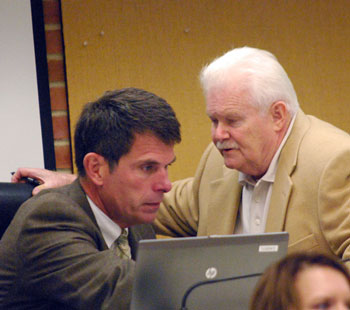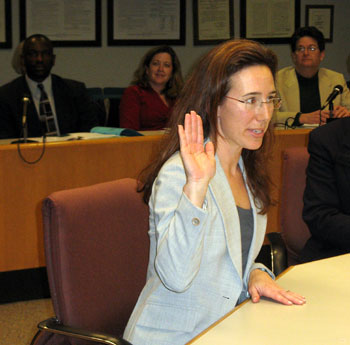Ann Arbor city council meeting (Sept. 16, 2013): Of the roughly 3.5-hour session, about an hour was devoted to two separate items that were added to the agenda the day of the Monday meeting.

From left: city administrator Steve Powers and Mike Anglin (Ward 5). (Photos by the writer.)
One of those late agenda additions was a confirmation vote of Al McWilliams’ appointment to the Ann Arbor Downtown Development Authority (DDA) board. The vote tally was 6-5, which was declared sufficient for confirmation. However, the city attorney is still reviewing the possibility that the confirmation required an eight-vote majority, under the council’s rules.
The debate on that item came late in the meeting, because that’s where nominations and appointments are slotted on the agenda template, based on the council’s current rules. But that will change in the future – due to a change in the council’s rules that was also on the Sept. 16 agenda. The council adopted some revisions to the rules that were three months in the works. Those included: adding an opportunity for public commentary to work sessions; changing the order of the agenda to move nominations and appointments for boards and commissions to a slot toward the start in the meeting; and prohibiting the use of personal electronic communications devices while at the council table.
Also related to the DDA on the Sept. 16 council agenda was the final approval of revisions to the city ordinance regulating the DDA’s tax increment finance (TIF) capture. The council again put off a vote on the question, which was given initial approval five and a half months ago – on April 1. The question was put off this time until Oct. 21.
The initially-approved amendments to Chapter 7 of the city code include various changes to governance, including term limits for board members, as well as clarifications to the existing language on TIF capture. The initially-approved amendments would enforce the existing language of the ordinance in a manner that would impact the DDA’s TIF revenue in a way roughly matching the DDA’s projected revenues in its 10-year planning document.
At the council’s Sept. 16 meeting, Stephen Kunselman (Ward 3) sketched out a different conceptual approach to the way the TIF capture is constrained. It’s an approach being developed by a joint committee of councilmembers and DDA board members as a “dual track” to the ordinance revisions currently under consideration.
Under the existing ordinance language, the amount of DDA TIF capture is calibrated to projections in the DDA TIF plan, which is a foundational document for the DDA. The different conceptual approach would establish a basis level for the maximum captured taxable value in the DDA district – a “cap” on TIF revenue – and then set some clearly defined annual increase, keyed to a specific percentage or some variant of a consumer price index (CPI).
A working document used by the joint committee at its Sept. 10 meeting showed two basic scenarios, one of which could roughly mimic the TIF revenue levels that would be provided under the current proposal, while the other might not provide any practical cap.
The second item added to the Sept. 16 agenda on the same day as the meeting was reconsideration of a vote on fossil fuel divestment taken by the council at its previous meeting, on Sept. 3. At that meeting, the council had voted 5-4 on a resolution calling on its employee retirement system to divest from fossil fuel companies. That tally defeated the resolution because it failed to achieve the necessary six votes on the 11-member council.
However, Margie Teall (Ward 4) voted with the prevailing side – one of the votes against it – giving her the right to bring a motion for reconsideration, which the council passed at its Sept. 16 meeting. But on the fossil fuel divestment resolution itself, after about 45 minutes of debate, the council voted to postpone the matter – until its Oct. 21 meeting.
In other business, the council approved the site plan for an expansion of a Honda testing facility, north of Ellsworth on Research Park Drive. The council also approved the rental of 8 extra trucks to supplement the city’s fleet during fall leaf collection season, at a cost of $117,200. It’s an annual expenditure.
Also on Sept. 16, the council formally accepted the final report of the North Main Huron River corridor task force.
The council also heard an update from Ann Arbor police chief John Seto on the preliminary assessment of newly implemented street closures for University of Michigan home football games. That preliminary assessment did not include any major problems, but Seto indicated that he wouldn’t draw conclusions until after a community meeting that’s being held to get additional feedback. That meeting takes place on Tuesday, Sept. 24 at 6 p.m. at Pioneer High School. [Full Story]







